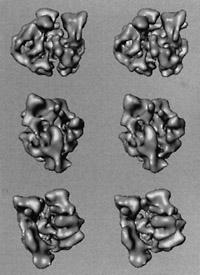Complete ribosomes

A team of scientists from the University of Santa Cruz of California have obtained images of complete ribosomes. An old dream of molecular biology has been fulfilled like this. Ribosomes are elementary components present in the cells of living beings and their function is to synthesize proteins. In addition, they act as a "bridge" between the genetic code formed by DNA and proteins. For this, they consist of two different sections.
They show how the ribosome parts obtained at UCSC University react to each other and how ribosome reacts with several molecules involved in protein synthesis. These images aim to analyze the behavior of ribosomes and understand how the elemental components that generate life act, looking in the future for practical applications such as the creation of best antibiotics.
So far, research has been limited to bacterial ribosomes, which by their larger size facilitate their representation. These ribosomes consist of 3 RNA molecules and more than 50 proteins, and researchers have used x-ray crystallography to obtain images. Ribosomes collect the genetic code needed to synthesize proteins through a messenger RNA, and with this information and the components provided by transfer RNA molecules form protein chains.





